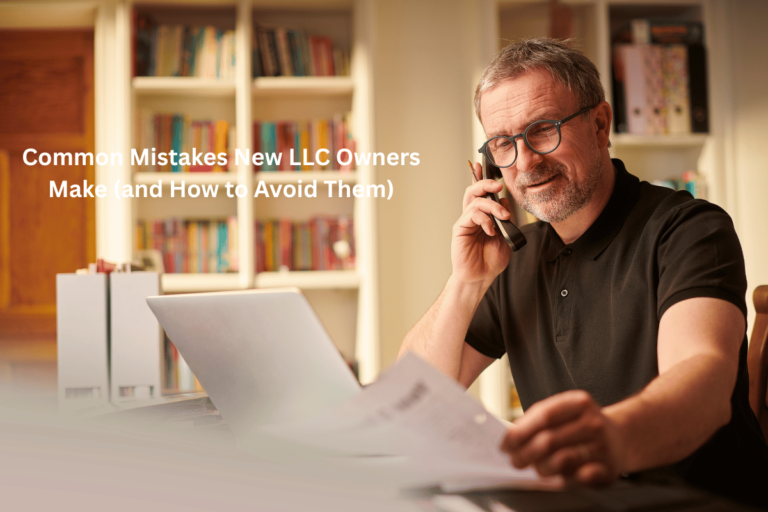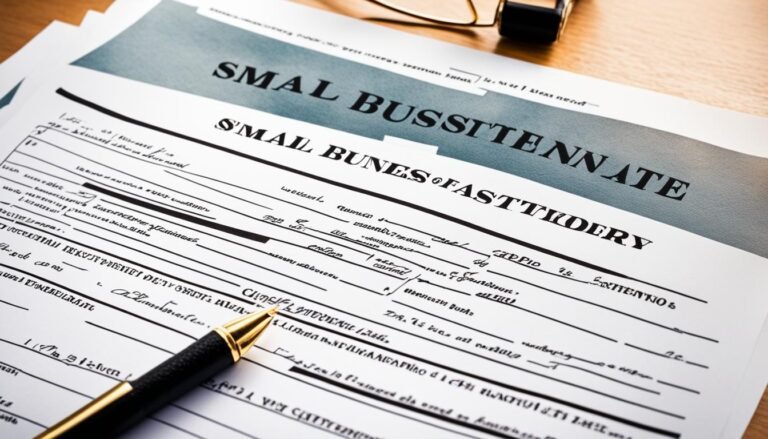Employment Discrimination: What SMEs Need to Know
Did you know nearly 6 out of 10 small and medium enterprises (SMEs) face work discrimination issues? These stem from race, gender, disability, or age. Such biases greatly affect employees and a small business’s overall success. Thus, it’s vital for small business owners to combat discrimination. This ensures they create a work environment that is both fair and inclusive.
Key Takeaways:
- Employment discrimination is a common issue among SMEs.
- Biases based on race, gender, disability, or age impact both employees and a business’s achievements.
- It’s essential for small business owners to tackle and eradicate discrimination.
Small Business Requirements for Employment Discrimination
Being a small business owner means you must know the laws on employment discrimination. These laws help keep things fair among your workers. They also make sure your workplace is positive and meets all legal duties.
Keeping Employment Records
As a boss, it’s important to keep good records for all your employees. Include things like their contact info, job details, and how much they make. Also note any promotions or issues they’ve had at work. Keeping these records helps show your business is fair and open.
Posting Information about Discrimination Laws
It’s also a must to have info on discrimination laws where everyone can see it. This means putting up the “EEO is the Law” poster. It tells your staff about their rights concerning discrimination. Make sure everyone sees this poster to create a fair work setting.
“Promoting a diverse and inclusive workplace not only strengthens SMEs but also fosters creativity, innovation, and productivity.” – EEOC Commissioner
Completing a Workforce Report
Sometimes, small businesses have to do a workforce report. It talks about the people who work for you and helps find any issues. By doing these reports, you can make your workplace better and make sure you treat everyone fairly. Not all small companies need to do a report, but knowing the rules is important.
By meeting these rules, you’ll make your small business a place that’s fair for everyone. It shows you care about having a diverse, welcoming, and equal place for your employees.
| Small Business Requirements | What it Entails |
|---|---|
| Keeping Employment Records | Maintaining accurate and up-to-date employee records, including contact information, work history, compensation, and performance evaluations. |
| Posting Information about Discrimination Laws | Displaying the “EEO is the Law” poster in a prominent location within the workplace to inform employees about their rights. |
| Completing a Workforce Report | Providing information about the composition of your workforce to ensure compliance with equal employment opportunity standards. |
Tips for Preventing Employment Discrimination in SMEs
As a small business owner, creating a fair and inclusive workplace is key. Knowing how to prevent discrimination and manage common issues is crucial. This helps build a respectful and lawful setting. Here are tips for navigating these challenges:
Handling Employee Requests for Leave or Religious Observances
When staff ask for time off for personal or religious reasons, aim to be fair. Have a clear leave policy that follows the law. This approach shows you meet employee needs. It helps keep your business running smoothly.
Considering an Applicant’s Criminal Record When Hiring
“Employment decisions should be based on an individual’s qualifications and abilities rather than their criminal record.” – Equal Employment Opportunity Commission
Work safety is very import but so is fairness. The EEOC suggests looking at someone’s criminal record case by case. This considers the crime’s nature and its relevance to the job. By doing so, you avoid discriminating against job seekers with a past.
Addressing Workplace Discrimination or Harassment
Discrimination and harassment must be stopped for a healthy workplace. Having clear anti-discrimination and anti-harassment measures is a must. Training employees to spot and stop such harmful actions is crucial. Make sure there’s a safe way for them to report these issues. This builds a respectful workplace and prevents legal troubles.
Educating and Training Employees
Teach your team how to build a discrimination-free workplace. Run training on diversity, inclusion, and how to deal with hidden biases. Encourage discussion and share materials that promote mutual understanding. This effort makes your workplace more united and welcoming to all.
Documenting Policies and Procedures
Writing down your anti-discrimination rules is vital. Make sure everyone can easily find and understand them. State the behavior you expect and the penalties for rule-breaking. Good documentation sets the standard for fairness and legality in your workplace.
Seeking Legal or HR Assistance When Needed
If you face complex discrimination issues, getting help from legal or HR experts is wise. They offer insights and make sure your business follows the law. Staying informed and seeking advice is crucial for a fair workplace.
Follow these tips to make your small business a diverse and fair place. Remember, a discrimination-free environment benefits both employees and your business’s image. It also avoids legal hardships and damage to your reputation.
EEOC Resources for SMEs
The Equal Employment Opportunity Commission (EEOC) has many resources to help small businesses. These resources are made to guide owners through laws against discrimination. They cover many discrimination topics, offering detailed help on how to follow the laws. By using these resources, small business owners can learn and act to make their workplaces fair and inclusive.
The EEOC offers a short and clear fact sheet for small businesses. It talks about the legal duties of small businesses regarding discrimination at work. This guide is easy to understand, making it simple for small and medium-sized enterprises (SMEs) to know what they need to do.
To help with understanding, the EEOC also gives a list of common terms used in EEO laws. This glossary is a go-to for defining tricky words. It makes reading and applying EEOC rules more straightforward.
The EEOC has organized its resources well. This makes it easy for owners to find what they’re looking for. It saves time and effort when they need to learn about specific discrimination and law compliance issues.
Using the EEOC’s resources means SMEs can deal with discrimination directly. Owners can get advice and learn how to follow laws. These insights help businesses to promote equality and fairness.
Making Employment Decisions: Best Practices for SMEs
Small business owners make lots of employment decisions daily. This includes hiring, training, evaluating, and even firing employees. These decisions are key to a small business’s success.
It’s vital for SMEs to use best practices while making these decisions. This ensures fairness and follows the law. By doing this, business owners help keep their work environment positive and avoid legal problems.
1. Basing Decisions on Objective Criteria
Deciding objectively is a top practice in employment matters. This means looking at things like qualifications, experience, and job performance. It makes sure choices are fair and based on merit.
2. Treating All Employees Fairly
It’s crucial to treat everyone at work equally. This means no showing favoritism or unfair treatment. A fair workplace values all employees, no matter their background.
3. Documenting Decisions and Reasoning
Businesses must keep a record of why they make employment decisions. This record-keeping shows decisions are sound and for the right reasons. It can be crucial if there’s a legal problem.
4. Seeking Legal or HR Assistance when Needed
Getting help from legal or HR experts is important for tricky decisions. Even if there’s no internal HR, professional advice is worth it. It helps with legal compliance and makes sure decisions are on point.
“Following best practices in making employment decisions is essential for small businesses. By basing decisions on objective criteria, treating all employees fairly, documenting decisions, and seeking professional assistance when needed, SMEs can create a fair and compliant work environment.”
| Employment Decision | Best Practices |
|---|---|
| Hiring |
|
| Training |
|
| Evaluating Employees |
|
| Disciplining Employees |
|
| Firing Employees |
|
Small Business Assistance for Employment Discrimination
Small business owners deal with tough times trying to understand employment discrimination laws. They often lack legal or HR help. But, there are ways to get help in managing these issues and following the law. The Equal Employment Opportunity Commission (EEOC) is one valuable support for small businesses. It gives advice and guidance designed just for them.
Support from EEOC
The EEOC is ready to help small business owners tackle employment discrimination. It offers several types of support:
- The EEOC conducts training programs. The aim is to enlighten small business owners on their legal duties. They cover how to prevent discrimination, deal with complaints, and make workplaces inclusive.
- Owners can get personalized help from EEOC professionals skilled in employment discrimination issues. This help is for any question or concern about workplace discrimination.
- There’s a dedicated contact line at the EEOC for small businesses. Owners can call for any information or support they might need. This helps in getting correct and quick answers for their situation.
With the EEOC’s support, small business owners can address employment discrimination problems. They can work toward making their workplace fair and inclusive.
Legal and HR experts also stand ready to help small business owners facing employment discrimination. They offer crucial advice, guide through laws, and make sure the business stays legal.
Seeking Assistance from Legal and HR Experts
Looking for help from legal and HR professionals is wise when employment discrimination shows up. They know a lot about laws and can provide specific advice for the business.
Legal experts help businesses understand laws and ensure their policies are compliant. They also provide aid with discrimination complaints. HR professionals offer key tips for a diverse and welcoming workplace. They suggest policies against discrimination and good employee training.
While hiring in-house experts might not be possible for small businesses, many external groups can fill this gap. These experts help businesses navigate employment discrimination, leading to better compliance with the law.
In short, small business owners have both the EEOC and legal, HR experts to turn to for help. This support aids in understanding and following employment discrimination laws. It leads to fair workplaces and less legal risk.
| Benefits of Small Business Assistance for Employment Discrimination | Support from EEOC | Assistance from Legal and HR Experts |
|---|---|---|
| Access to training programs | ✔ | ✔ |
| One-on-one assistance | ✔ | ✔ |
| Contact for questions or support | ✔ | ✖ |
| Expert advice and guidance | ✖ | ✔ |
| Compliance with employment laws | ✔ | ✔ |
Getting help from the EEOC and working with legal and HR experts significantly helps small business owners. They can deal with employment discrimination correctly, make their workplaces open, and stay in line with the law.
Small Business Videos on Employment Discrimination
Running a small business means needing information fast. Small business videos by the Equal Employment Opportunity Commission (EEOC) help a lot. They give quick, clear info on employment discrimination.
These videos are great for business owners. They cover things like what interview questions not to ask. Watching them makes it easy to understand important topics quickly. This lets business owners avoid discrimination problems.
Small business owners can watch these videos for several reasons. Maybe they want to refresh about discrimination laws. Or to learn how to make their workplace fair and inclusive. Small business videos like these give clear, helpful advice.
Small business videos help SMEs teach their staff about discrimination. Watching them means owners can tackle discrimination issues better. They can make their workplace welcoming for everyone.
Advantages of Small Business Videos on Employment Discrimination:
- Easy access to quick and basic information
- Straightforward and concise guidance
- Relevant to specific small business needs
- Enhances understanding of discrimination laws
- Provides guidance on best practices
- Promotes a fair and inclusive work environment
Thanks to the videos from the EEOC, small business owners can do a lot. They can get better at handling discrimination. They can also make a great, inclusive space for their team.
Employment Discrimination in SMEs: Contact Us for Assistance
Small business owners are crucial for a fair work environment. But, understanding and dealing with discrimination can get tricky. SMEs should know they are not alone. Helpful organizations are ready to offer advice. You might need training, individual help, or just have questions. These groups are there to guide and support you.
Small Business Assistance
Dealing with employment discrimination isn’t something you have to tackle by yourself. The Equal Employment Opportunity Commission (EEOC) assists small businesses. They offer resources and help that fit the needs of SMEs. Their services help SMEs follow discrimination laws and stay on track.
The EEOC provides training to educate on discrimination laws and how to prevent them. This knowledge and these tools are essential for a workplace free of discrimination.
SMEs might need personalized help to cope with specific discrimination challenges. The EEOC offers individual support. This allows small business owners to talk about their issues and get advice that meets their unique needs.
Contacting Us
If you’re facing employment discrimination challenges, reach out for help. Contact the EEOC or similar organizations for guidance. You can reach the EEOC via their website or phone. Their experts are ready to aid you. They will make sure your SME knows how to handle and prevent employment discrimination effectively.
Feel free to contact us for:
- Training
- One-on-One Assistance
- Specific Questions
By taking advantage of the available help and resources, small business owners can navigate employment laws. They can make their workplace fair, inclusive, and compliant.
Legislative Changes Impacting SMEs and Employment Discrimination
The Ministry of Business, Innovation and Employment has shared new laws that will change how businesses work, especially small and medium ones. These new laws are here to make things easier, clear up rules between employers and employees, and cut down on paperwork. For small and medium businesses, these changes matter a lot in following employment laws about discrimination.
One big change is that small and medium companies will have more freedom in how they run their teams. This means they can adjust better to different needs from the market, customers, and the economy. Yet, they must still follow rules on discrimination at work.
With clearer rules on how employers and employees should work together, small and medium businesses will know better what they have to do. This makes it easier for them to be fair and welcoming at work and avoid getting into legal trouble.
Also, dealing with rules against discrimination will be less of a headache for these businesses. The processes and rules will be simpler, which could mean less time and money spent on following these laws. This change lets small and medium businesses focus more on what they’re best at, all while keeping their workplaces safe from discrimination.
It’s really important for these businesses to learn the new laws and make sure they’re doing everything right. Being up-to-date and ready to make changes will help them stay on the right side of the law.
Getting help from legal or HR experts can be a smart move for small and medium businesses. These experts can give advice tailored to their needs. They can guide businesses through these law changes and support them in making good decisions.
Summary:
The Ministry of Business, Innovation and Employment is rolling out new rules that will help small and medium businesses. These rules aim to bring more freedom, clarity, and less paperwork on issues like discrimination at work. By staying informed and seeking expert advice, businesses can adjust their ways to meet these new rules. This way, they can run more smoothly, cost less, and keep their workplaces fair and safe for everyone.
| Impacts of Legislative Changes on SMEs and Employment Discrimination | |
|---|---|
| Increased Flexibility | SMEs will have more options to manage their workforce while remaining compliant with employment discrimination regulations. |
| Clarity on Employer-Employee Relationships | SMEs will have a clearer understanding of their obligations and can make informed decisions in line with employment discrimination laws. |
| Reduced Regulation and Compliance Costs | SMEs will benefit from streamlined processes and simplified compliance requirements, minimizing administrative burdens and associated costs. |
Conclusion
Employment discrimination is a serious issue for small and medium-sized enterprises. They must follow laws and guidelines and use available resources. By doing this, they can make sure their workplaces are fair and legal.
Working against discrimination makes the workplace better. It reduces the chance of being sued for discrimination. It also protects the company’s image. Businesses that treat everyone equally attract the best workers.
To prevent discrimination, businesses should know the law, make clear rules, and teach their workers. This way, everyone at the company feels like they have an equal chance. Small and medium-sized enterprises play a big role in making society inclusive. This enriches the careers of many people in different fields.
FAQ
Q: What do small business owners need to know about employment discrimination?
A: Small business owners should know about discrimination laws. They must also follow guidelines from the EEOC. This helps keep the workplace fair and compliant.
Q: What are the requirements for small businesses regarding employment discrimination?
A: Small business owners need to keep employment records. They should also post information on discrimination laws. Completing a workforce report is sometimes necessary to make sure they are following the laws correctly.
Q: How can small businesses prevent employment discrimination and handle workplace issues?
A: They can avoid discrimination by managing employee leave, considering prior criminal records, and dealing with harassment. It’s important to take these issues head on.
Q: What resources does the EEOC provide for small businesses?
A: The EEOC has resources specifically for small businesses. These include fact sheets, glossaries, and organized information. They help small business owners understand and comply with discrimination laws.
Q: What are the best practices for making employment decisions in SMEs?
A: Making decisions should stand on objective criteria. All employees should be treated fairly. Document all decisions and get legal or HR help when needed.
Q: Where can small business owners find assistance with employment discrimination issues?
A: Small businesses can get help from the EEOC. This includes training, one-on-one advice, and support for any questions about discrimination at work.
Q: Are there small business videos addressing employment discrimination?
A: Yes, the EEOC has made videos tackling employment discrimination. These include interview tips and critical info for running a fair workplace.
Q: How can small businesses connect with assistance for employment discrimination?
A: Contacting the EEOC or similar groups offers help. This includes training, one-on-one advice, and answers to specific questions on discrimination.
Q: How do legislative changes impact SMEs and employment discrimination?
A: Recent laws aim to make things clearer, more flexible, and less costly for all businesses. These changes might alter how SMEs handle discrimination issues.







